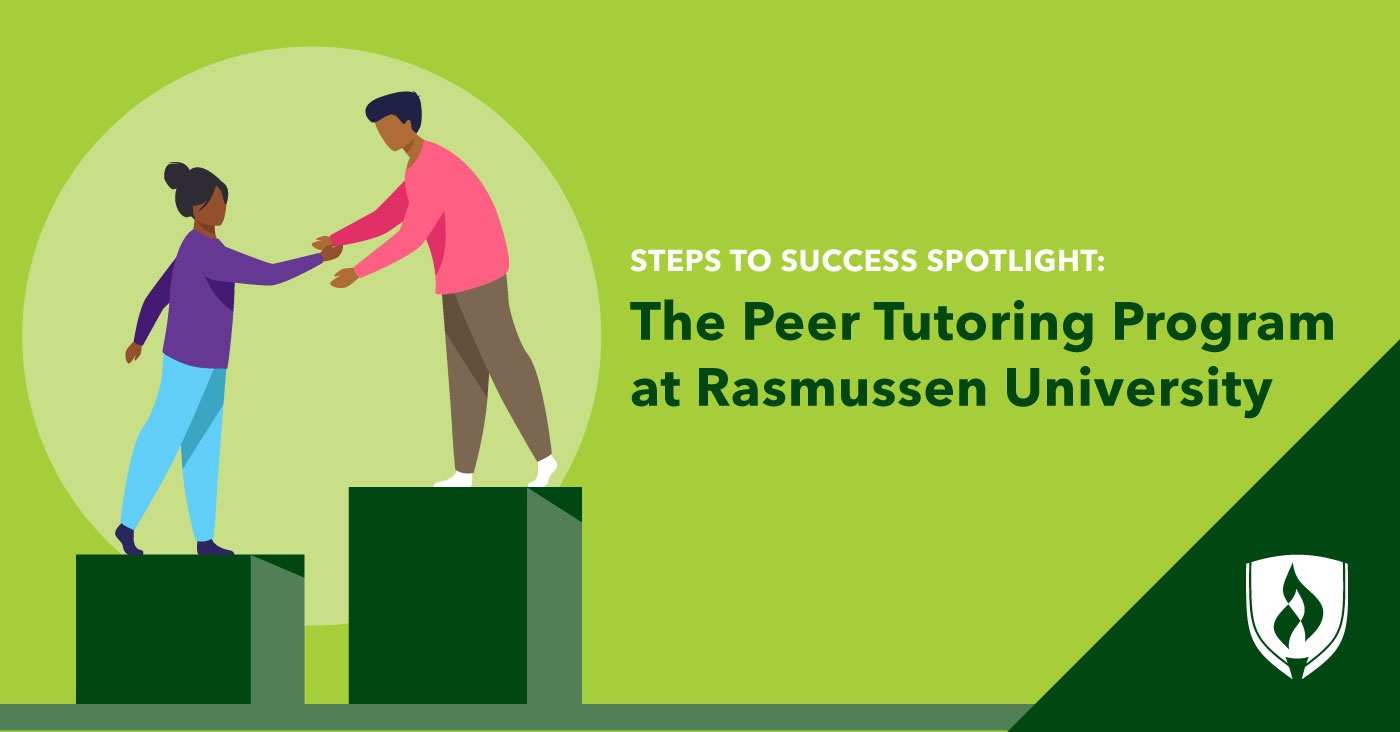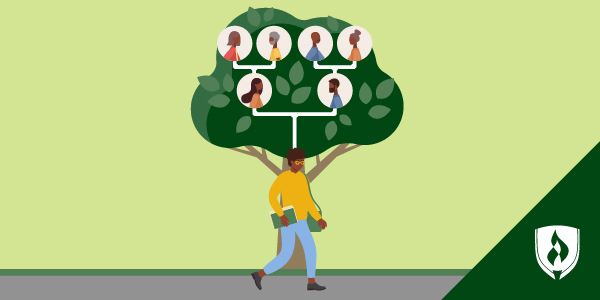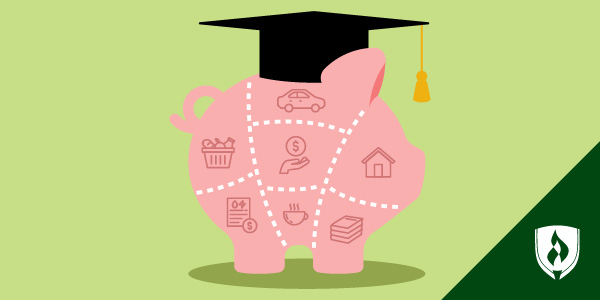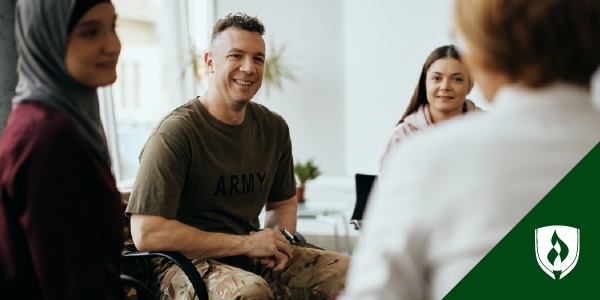Steps to Success Spotlight: The Peer Tutoring Program at Rasmussen University
By Carrie Mesrobian on 05/17/2021

It’s no secret navigating college academics can be a little intimidating—particularly if it’s been a while since you’ve been in the classroom. While there might be a learning curve as you adapt to college courses, you won’t have to figure it all out on your own.
Students at Rasmussen University are provided with a variety of student support services and resources that can be a big help—and that includes the Peer Tutoring program. This student-to-student approach to support gives you an opportunity to seek out tips and guidance from those who know firsthand what it takes to succeed academically at Rasmussen University. If you’ve ever wondered what all goes into this student support service, read on to learn how peer tutoring continues to make a difference in the academic success of students, on both sides of the conversation.
What do peer tutors do?
The Peer Tutor program at Rasmussen University is an award-winning service provided by the Library and Learning Services team.1 According to Cassandra Feidt, Learning Services coordinator, the mission of the program focuses on “empowering students, collaborating with faculty and staff, and cultivating lifelong learning.”
Peer tutors are students at Rasmussen University themselves, who have been specially selected and trained to help other students improve study skills and find resources to help them succeed in their coursework.
“These are high-performing students,” Feidt says, coming from a variety of programs. Often, Feidt continues, peer tutors are students who used peer tutoring sessions themselves because they have firsthand knowledge of how the program can help academically.
What does a peer tutor session involve?
Peer tutoring sessions are conducted at the request of a student seeking assistance. Learning Services coordinator Bonnie Ostrand says signing up for tutoring sessions is easy, with sessions available to all students at any stage of their programs.
Ostrand explains that Rasmussen University students can book a tutoring session online by using the Tutor Match tool found under the Resources section of the Student Portal. If you’ve ever booked an appointment online, the process should be a breeze. That said, for students wanting more information about tutoring sessions, Ostrand suggests this link: “Tell me more about Rasmussen peer tutors.”
Sessions can focus on particular courses, technical academic questions, like APA citation, or finding study guides to help review material.
“If a student comes to a session looking for specific answers, I’ll tell them that I’m not able to do their assignment,” says Brittany Rawlinson, a peer tutor and Graphic Design student. “But I can show them how to be successful by including them in solving the problem.”
“90 percent of our job is showing students the resources that are out there for them,” says Rebecca Plotts, a peer tutor and Criminal Justice student. Plotts remembers her own experience of struggling without help. “Sometimes, I will say, before we even start a session, ‘Wait a minute, I need to show you this.’ Because I have struggled with classes without realizing the kinds of help that was right there.”
A session with a peer tutor at Rasmussen University can be more than just honing study skills and getting connected with helpful resources. Sometimes, a tutoring session offers a listening ear from someone who understands.
“I really like connecting with other students,” explains Maria Sierra, a peer tutor and Nursing student. “I can relate to a lot of what they’re going through: the stress, always having to study. I remind them to take breaks, go for a walk, go running.”
This support and continuous learning often go both ways.
“I’ll work with students on a dosage calculation equation,” says Christina Frates, a peer tutor and Nursing student. “And sometimes they’ll have a strategy I’ve never heard of! So I’m learning too.”
Sierra has had similar experiences. “The other day in a session, I learned about practice questions I didn’t know you could access from our MedSearch books.” The continual engagement with the material helps solidify understanding for peer tutors, which they go on to share with their students.
“Applying the skills I’ve learned helps everybody, not just me,” says Maria Ramirez, a peer tutor and Criminal Justice student. “When students ask certain questions, that triggers me to ask about their learning styles. People learn in different ways; it’s good to help them identify how they learn best. Our goal is to foster learning independence.”
“Students feel much more open about expressing the problems they’re having because I am a peer,” Plotts explains, saying that she passes on common student struggles to Learning Service coordinators in an effort to give voice to their concerns.
How are peer tutors selected and trained?
Peer tutors must have a GPA of 3.0 to apply. The application process includes an essay, a background check and an interview.
When Feidt is interviewing peer tutor candidates, she looks for strong students who like to help others. She often meets students who think they’re not ready to be tutors because they think they need to be in school for longer.
“That’s not what we look for in hiring,” Feidt says. “Because we provide robust training, as soon as someone has taken courses and demonstrated they are effective learners, that’s the sweet spot.”
Learning Services coordinator Kristie Keuntjes cites, “A willingness to continue to learn, a positive and encouraging nature. Everything else can be taught and trained, but if you have that mentality, you can do it.” Specifically, for Nursing School peer tutors, Keuntjes seeks candidates with a soothing, relaxed presence.
“Nursing school can be a high-stress environment,” Keuntjes continues. “When you work with a tutor with a calming presence, they can help bring you out of the weeds and into the forest.”
“Everyone has their point where they’re overwhelmed, frustrated,” says Christina Pierson, a peer tutor and Information Technology student. “Everyone needs somebody who says, ‘It’s okay, I relate.’”
The training for peer tutors at Rasmussen University is significant. All peer tutors are College Reading and Learning Association (CRLA) Level I Certified tutors. This involves a four-week online training class and webinars on a variety of topics, all of which require assessments. This is followed by 10 hours of documented training and more evaluation, including observations from other peer tutors and Library and Learning Services staff. After 25 hours of tutoring, peer tutors are eligible for certification.
This training program is also certified by the CRLA’s International Tutor Training Program, a popular and well-respected distinction in higher education, since 2013 and in that time, the University has certified 197 peer tutors and counting.
This training is valuable experience and an excellent credential for peer tutors to include on their resumes.
“This is the best position I’ve ever had,” says Brittany Rawlinson, a peer tutor and Graphic Design student. “They invest in you and build your skills.”
What are the benefits of being a peer tutor?
“Tutoring brought out the real college experience for me,” says Rebecca Plotts. “When I first started school, I didn’t think I was going to meet the friends I’d have for the rest of my life. And then I started tutoring.”
The friends Rebecca Plotts has made through peer tutoring have been sources of support and connection. “Tutoring opened up a lot of doors for me, to help people, to understand them,” Plotts continues. “I’ve learned from people from all walks of life, from all over the world. I don’t think I ever would have had that opportunity in my small town.”
Christina Pierson has found tutoring to be a wonderful personal and professional experience. “The team and the collaboration we have, the love we have for each other,” Pierson reports. “I don’t know anyone who wouldn’t benefit being a part of it. I’m so grateful. Without this experience, I’d have to fight so hard to get an employer to pick me.”
Maria Sierra believes that tutoring helped bolster her academically. “The reason I passed my Pharmacology course is because I tutored so much in it,” Sierra explains. “I feel like it’s always keeping the material fresh in my head.” Sierra also says that her experience as a tutor will help her as a future nurse. “Being a tutor, you have to let the other person talk,” she adds. “I’ve learned to be patient and listen. This relates a lot to nursing because when you see patients, you have to listen to them.”
Christina Frates has found tutoring both academically and professionally rewarding. “I have the affirmation that I’m in the right place,” she says. “You’re in this to help patients, to help make a difference in lives of those you serve.”
Patience is also a benefit for Ramirez, as well as confidence. “My patience has grown immensely,” Ramirez says. “And it’s also made me believe in myself. I know that I can do it. I’m not that same person wondering if I was good enough, because of all the support of Learning Service coordinators and from students thanking you constantly. It really helps build confidence within yourself.”
A sense of satisfaction is a common benefit peer tutors report, says Feidt. “They find learning to be so motivating—and fun,” Feidt adds. “I hear that so much: ‘I helped someone learn something!’—that spark.”
Feidt says she regularly sees tutors become a lot more confident and proficient in their subject areas as they settle into their roles.
Many peer tutors go into leadership and teaching roles, reports Keuntjes, who adds that some have even returned to Rasmussen University as adjunct instructors and faculty.
“We teach them how to speak to the CRLA credential in their job search,” Keuntjes explains. “When you’re a tutor, your continual engagement in learning sets you up for success.”
Find the support you need
Whether you’re considering applying or would like to seek out their assistance, the Peer Tutor program is just the beginning of what Rasmussen University offers in student support. Take a minute to read more about other ways the University can help in“9 Surprising Student Resources You Didn’t Know Rasmussen University Offered.”
1Innovative Use of Technology Award from the National College Learning Center Association, 2014.




